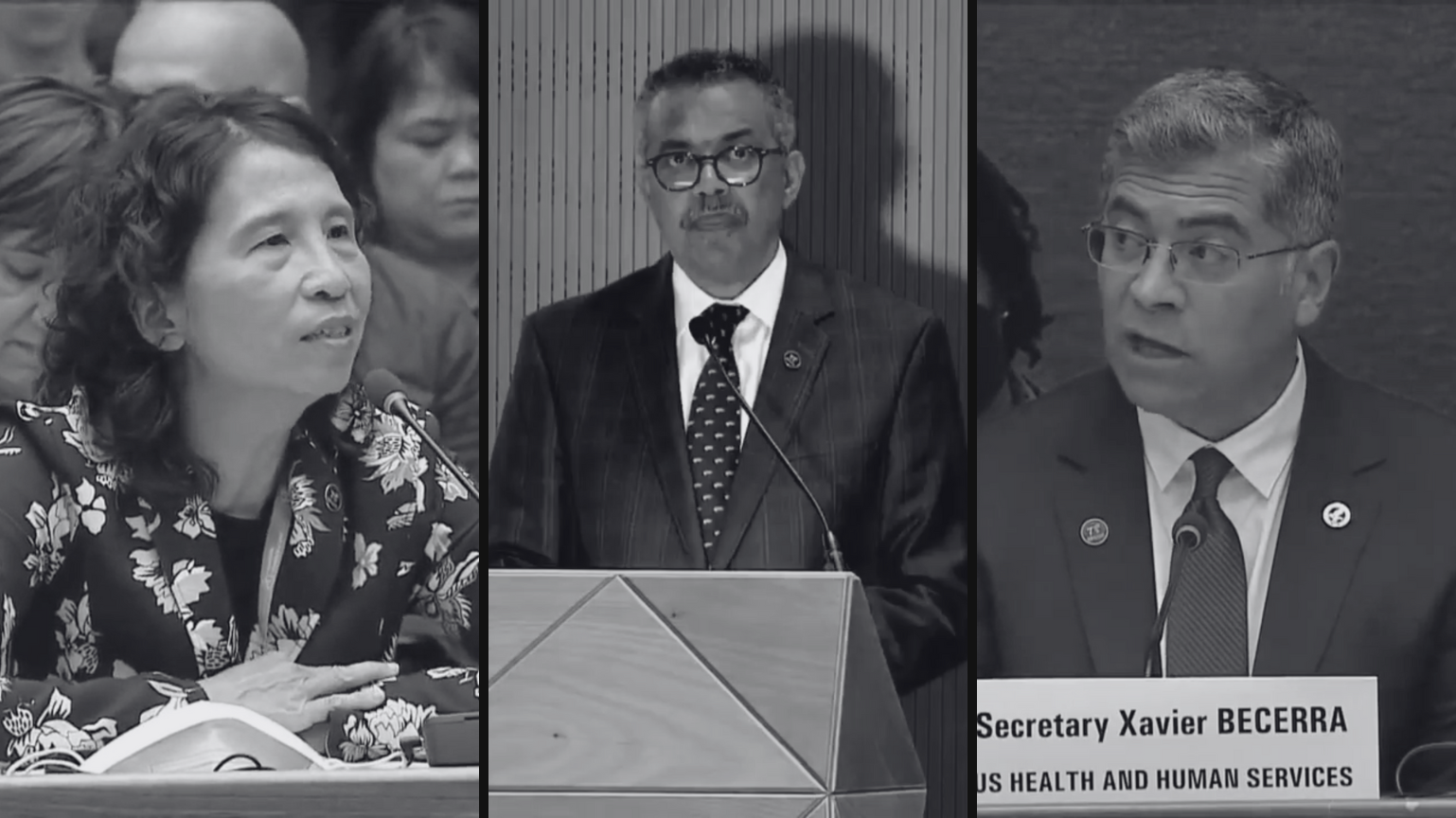Since the start of the Covid pandemic, powerful institutions have been using it as an opportunity to usher in more surveillance and speech control.
One of these institutions, the WHO, an unelected global health agency, has spent more than a year pushing to expand its powers via two instruments — a pandemic treaty/accord and amendments to the International Health Regulations (2005). These instruments will collectively give the WHO, an unelected health agency, new powers to target “misinformation,” grow its surveillance tools, and push a framework for global vaccine passports.
And last month, during a roundtable at the seventy-sixth World Health Assembly (WHA), the annual meeting of the WHO’s decision-making body, US Secretary of Health and Human Service Xavier Becerra (an unelected bureaucrat who was appointed by President Joe Biden with the consent of the US Senate), Canada’s Chief Public Health Officer Theresa Tam (an unelected bureaucrat who was appointed by former-Canadian Health Minister Jane Philpott), and others gave the instruments their full backing.
Becerra said that the US is committed to the work of the WHO’s intergovernmental negotiating body (INB) (the group that’s responsible for drafting and negotiating the pandemic treaty), the International Health Regulations (IHR) amendments, the strengthening of “biosurveillance and data systems for early warning to biological threats,” and the enhancement of “equity in pandemic preparedness and responses.”
He also noted that US President Joe Biden’s budget proposal for 2024 includes “a multi-billion dollar investment to make sure America’s prepared for “the next public health crisis” and $1.6 billion for “global health action.”
Additionally, Becerra touted the Biden administration’s commitment to the Pandemic Fund — a fund that’s hosted by the World Bank (a global financial institution that provides loans and grants to low and middle-income countries), has the WHO as a technical lead, and provides pandemic prevention and preparedness funding to low-and-middle-income countries.
Becerra pointed to the Biden regime’s previous $450 million commitment to the Pandemic Fund, highlighted an additional $250 million commitment to the fund that the Biden admin had recently made, and said “more investment is needed.”
Tam said that it’s “absolutely amazing to have the chairs of the INB and the IHR review” and that Canada is “committed to taking a collaborative approach with multiple partners on shared health priorities.” Additionally, she said that the “WHO should absolutely be at the center and playing a really critical role in this global health architecture.”
France’s representative expressed full commitment to the “pandemic agreement” and the IHR amendments and said that both are “vital.” She also said France supports the pandemic treaty being guided by One Health — a WHO surveillance system that uses links between “the health of people, animals and ecosystems” to “create new surveillance and disease control methods.”
Not only did representatives from several nations commit to the WHO’s power grab via the pandemic treaty and IHR amendments but Dr. Tedros Adhanom Ghebreyesus, the WHO’s Director-General, pushed member states to support these measures and other forms of increased surveillance throughout the seventy-sixth WHA.
During the opening of this year’s WHA, Dr. Tedros said: “The pandemic accord…must be a historic agreement to make a paradigm shift in global health security.”
During his live remarks at the seventy-sixth WHA, the WHO Director-General discussed how the WHO is expanding its surveillance and monitoring systems, urged members to adopt the IHR amendments and the pandemic accord, and called for members to provide more funding to the WHO.
And during the roundtable where WHO member states supported the treaty and IHR amendments, Dr. Tedros urged member states to deliver the pandemic treaty “on time,” told them to focus on “bold amendments” to the IHR, thanked the US for recommending that member states start amending the IHR, and urged member states to “keep WHO at the center of the global health architecture.”
In addition to member states and the WHO Director-General praising the pandemic treaty and IHR amendments, the WHO also published several documents about increased WHO surveillance and “management” of information that the WHO deems to be “false or misleading” during the seventy-sixth WHA.
One of these documents, “Strengthening WHO preparedness for and response to health emergencies,” contains plans for “collaborative surveillance” and “infodemic management” (infodemic is a WHO buzzword that describes “too much information including false or misleading information in digital and physical environments during a disease outbreak.”)
Another of these documents, “WHO’s work in health emergencies,” outlines the WHO’s plans to expand One Health as part of a five-year plan between 2022 and 2026.
And in a document titled “Implementation of resolution WHA75.11 (2022),” the WHO noted that it “continues to support the response to coronavirus disease (COVID-19) by strengthening surveillance.”
As it pushes for increased powers, the WHO has also demanded that member states, many of which are experiencing difficult economic conditions at home, provide hundreds of millions of dollars in additional funding to this unelected health agency.
And member states complied with these demands by agreeing to pay an additional 20% to the WHO in 2024-2025 at the seventy-sixth WHA. Member states are already set to pay the WHO more than $950 million in dues for 2022-2023 so this 20% increase represents an increase of almost $200 million. Plus, member states already paid more than $270 million in voluntary contributions for 2020-2021.
While the current version of the pandemic treaty doesn’t include a specific budget for the implementation of the treaty, it does require WHO member states to establish funding mechanisms to support the treaty’s implementation. Previous versions of the treaty proposed that WHO member states pay billions of additional dollars per year to various projects.
The WHO intends to finalize the pandemic treaty and IHR amendments by May 2024.








